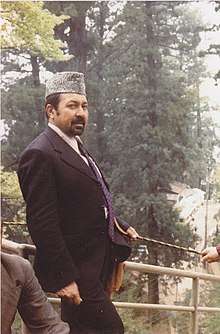Asmatullah Rohani
Asmatullah Rohani (August 3, 1937 Balkh - September 24, 2017, Guelph) was an Afghani lawyer, educator and activist. He was a prominent critic of the Soviet Union for human rights abuses it committed during the Afghan Civil War.
Asmatullah Rohani عصمت الله روحاني | |
|---|---|
 | |
| Nationality | Afghan |
| Occupation | Judge |
Rohani's father Hamdullah was a judge in Northern Mazar-e Sharif province. The family was part of the Yousufzia tribe in Eastern Kunar Province.
Rohani completed his primary education at Shiah Koat Ahdad primary school in Nangarhar province. In 1950, he was admitted to Madrassah Imam Abu Hanifa in Kabul. Rohandi graduated in 1957,then got his BA in 1961 from faculty of Islamic law at Kabul University.
In 1972 Rohandi went to Australia on a scholarship for his higher education in international law and later in 1976 he went to Japan for further studies.[1]
Professional career
After completing his studies overseas, Rohani returned to Afghanistan and served as Supreme Court ( Pashto: ستره محكمه) judge at the ministry of justice in Kabul,. Later he was appointed as the director of the Supreme Court ( Pashto: ستره محكمه) judge to Paktika province. He also taught part-time at the faculty of Islamic law in Kabul University.
In 1980, Rohani joined the National Committee for Human Rights. He documented human rights abuses and atrocities committed by the Afghan regime and Soviet forces against the civilian population of Afghanistan. In 1987, Rohani was hospitalized in Kabul after a failed assassination.
Soon after the attack, Rohani and his wife fled the country, crossing a remote mountain by foot to Pakistan. They joined their children who were already living in Peshawar, Pakistan. Rohani joined the Writers of Union of Free Afghanistan and wrote a book called.[2]
In 1988, the US Government invited Rohani to visit the United States. In Washington, he met with several members of congress to discuss the future of Afghanistan. Rohani was also invited to Voice of America for a special session on Afghanistan.
After returning to Peshawar, Rohani was appointed as director of the free lawyers of association of Afghanistan. In May 1991, the South Korean government invited him to visit that country, where he participated in the Second Conference of the Presidents of Bar Association in Asia. He had several interviews with Korean television, where he discussed the need for helping the Afghan people after the Soviet troop withdrawal.
In 1994, Rohani joined his children in Canada. He completed and published two more books in Pashto language called Rohani Palwashi and Rohani Salghai.[3]
Rohani died in Guelph, Ontario on September 24, 2017.
References
- Da Leekwalo Leekane | SCPRD.COM Archived December 31, 2010, at WebCite
- Yusufzai - Jahad-Fi-Sabilellah [Pashtu] / edited by Asmatullah Rohani Yusufzai Archived December 31, 2010, at WebCite
- Ashian cultural, social & family magazine for Afghan community in North America volume. 2 number 25, Pages 30 – 31, Ashian Graphics & Publications, Toronto, Ontario, Canada May 2005
External links
- Da Leekwalo Leekane | SCPRD.COM
قاضي عصمت الله روحاني - Da Leekwalo Leekane | SCPRD.COM
قاضي عصمت الله روحاني - http://www.pashtoonkhwa.com/?page=pashtoonkhwa&id=157
قاضي عصمت الله روحاني - http://wepakhtoons.blogspot.com/2010/07/poem-life-of-pakhtoons.html
قاضي عصمت الله روحاني